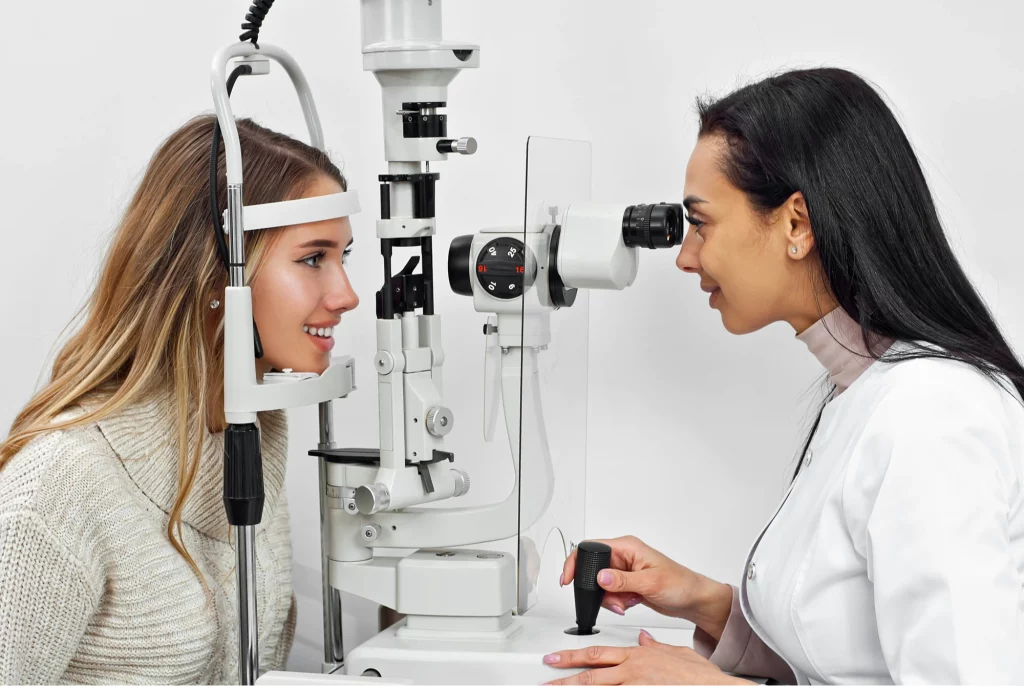Medically Reviewed by: Nicholas P. Bell, M.D.
How Do You Know if You Have Glaucoma?
How do you know if you have glaucoma? This question might be one you begin asking if, suddenly, you find your vision getting worse. First things first: don’t panic, don’t jump to conclusions, and make an appointment with your ophthalmologist. There are many reasons why your vision could suddenly take a dive, and they can help pinpoint exactly what is causing your vision to degrade.
However, all of that said, sudden vision loss can be a symptom of glaucoma.
Glaucoma is an irreversible eye disease that can dramatically affect the optic nerve. Glaucoma causes are still being studied, but the most frequently-cited cause is high pressure in the eye causing damage to the optic nerves. Eventually, glaucoma can lead to vision loss and, in rare cases, blindness.
Since it can be difficult to spot early symptoms of glaucoma, it’s important to know the basics of the disease: what the early warning signs of glaucoma are, how to prevent and/or slow the progress of glaucoma, and your treatment options.
How do you know if you have glaucoma? The first signs
Each type of glaucoma has some symptoms that are particular to it. There are four types of glaucoma, with two types in particular being more prominent. So if you’re wondering, “What is the first sign of glaucoma?” or even “What are the symptoms of high eye pressure?” then you need to understand the differences between open-angle glaucoma and acute angle-closure glaucoma.
The basics of open-angle glaucoma
With open-angle glaucoma, symptoms only really pop up once you’ve already experienced substantial vision loss. Because of these circumstances, it is very hard to detect this form of glaucoma early on without an experienced doctor and regular eye exams. You might experience symptoms such as blank spots or tunnel vision, but other than that, symptoms may not surface until the disease is already advanced.
The basics of acute angle-closure glaucoma
Acute angle-closure glaucoma is not as common as open-angle glaucoma, but the symptoms are more noticeable. However, once symptoms do show up, you can expect damage to happen quickly, and you will need to see a doctor as soon as possible. Symptoms can include halo lights, eye or head pain, nausea, and blurry vision.
Prevention and treatment of glaucoma
It can be difficult to spot glaucoma on your own, especially since glaucoma can be “symptomless” before it causes permanent damage. This is why regular eye exams are not only important for the overall health of your eye but one of the primary ways to prevent and begin early treatment of glaucoma. Remember — early treatment is your best defense against glaucoma.
With regular eye exams, your doctor can also provide you with custom tips based on your health history and help you understand whether or not you’re more at risk of developing glaucoma. These tips should give you a better chance of avoiding glaucoma altogether.
On top of this, your doctor can conduct tests during your eye exams that can detect the disease before you experience any substantial vision loss. If you are diagnosed with glaucoma, your doctor can then provide you with a variety of glaucoma treatment options, including medication and options for glaucoma surgery, including the i-Stent surgery for glaucoma for patients who also have cataracts.
General tips to help you avoid or slow down the progression of glaucoma
- Regular eye exams: Not to sound like a broken record — but whatever you do, don’t forget to treat your eyes to regular exams! If you’re under the age of 30, you can likely go every 2-4 years without an exam (if you’re experiencing no issues). But as you age, you’ll need to reduce the amount of time between each exam.
- Treat your body right: Eating right, exercising daily, and not smoking can help you steer clear (or at least slow down the progression) of glaucoma. This will promote blood flow and help lower your intraocular pressure (IOP), which is critical in the fight against glaucoma.
- Protect those eyes: While it may seem like common sense, protecting your eyes isn’t something most people think about on a regular basis. It’s a lot like applying sunscreen — we know we should, but do we really? Your eyes are no different than your skin. Protect them from the sun by wearing sunglasses and avoid unnecessary risks, like looking directly at the sun.
FAQ: How long does it take to go blind from glaucoma?
With a diagnosis of glaucoma, some patients are quick to worry about going blind. Fortunately, glaucoma tends to progress slowly and, so long as you are making your regular eye doctor appointments, you will likely catch the disease in enough time to treat it. While there is no cure for glaucoma, treatment can frequently reduce the rate of progression such that patients will be able to read and see well all the way into their old age.
Without treatment, glaucoma will likely advance more quickly. The rate of progression will depend highly on the patient’s eye health and the type of glaucoma they’re experiencing. It is estimated that untreated glaucoma may cause blindness 10-20 years after onset, but these numbers still vary widely.
Prevent and treat glaucoma at Eye Center of Texas
In short, the best piece of advice we can offer to patients wondering, “How do you know if you have glaucoma?” is to visit your ophthalmologist.
At Eye Center of Texas, we want to keep Houstonians seeing clearly for many years to come. Our doctors have performed thousands of successful eye surgeries, including glaucoma and iStent eye surgery. Concerned that you may have glaucoma? Simply experiencing more vision loss than normal? Give us a call at 713-797-1010 or request an appointment online.
More Helpful Articles by Eye Center of Texas:
Related Articles
Financing Options Available
Apply today to find a financing option that meets your needs.
Our Locations
Houston/Bellaire
6565 W. Loop S., Suite 650Bellaire, TX 77401
Medical Office:
713-797-1010
Medical Fax:
713-357-7276
LASIK/Near Vision:
Office: 713-395-1515
Fax: 713-357-7278
Pasadena
4415 Crenshaw RoadPasadena, TX 77504
Medical Office:
281-977-8800
Medical Fax:
281-977-8877
Sugar Land
15200 S.W. Freeway, Suite 130Sugar Land, TX 77478
Medical Office:
281-277-1010
Medical Fax:
281-277-4504
Clear Lake
455 E. Medical Center Blvd., Suite 110Webster, TX 77598
Medical Office:
281-332-1397
Medical Fax:
281-282-9152
Katy
Greenhouse Medical Plaza2051 Greenhouse Road, Suite 110
Houston, TX 77084
Medical Office:
346-547-7070
Medical Fax:
281-214-2971
The Woodlands/Conroe
100 Medical Center Blvd., Suite 118Conroe, TX 77304
Medical Office:
936-647-1610
Medical Fax:
936-647-1620


